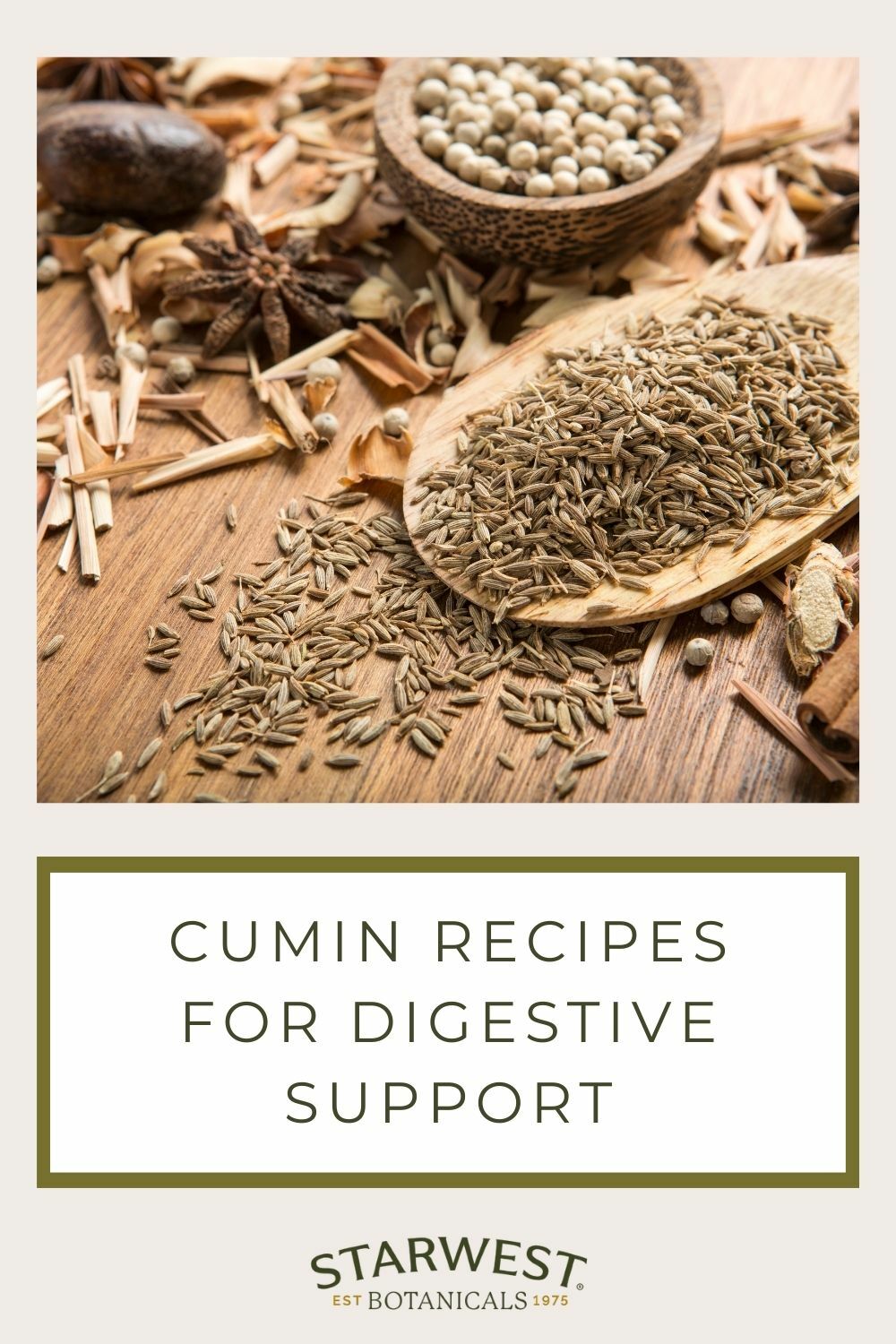Cumin Recipes | Starwest Botanicals
Posted by Molly McConnell on 04-22-2024

From the Kitchen to the Apothecary
Cumin (also called “Jeera” in Hindi and “Jiraka” Sanskrit) has been a staple spice in the Ayurvedic paradigm for thousands of years. From the kitchen to the apothecary, this special seed appears throughout a variety of long-standing culinary traditions, as well as classical herbal remedies.
Cumin exhibits pungent and bitter tastes. Ayurvedically speaking, the bitter taste is believed to trigger the flow of bile and support liver function. The pungent taste is believed to activate the digestive system in a way that may encourage a more effective breakdown of foods, promote healthy absorption and support the elimination of natural toxins.
Cumin is generally considered to have a heating action with the body. As a result, it may exhibit a gentle stimulating effect on the internal organs — particularly the organs of digestion.
If you’re curious about exploring natural herbal remedies with herbs that you already have on hand, cumin is a great starting point. Below you will find several classical Ayurvedic remedies that demonstrate different ways to use cumin powder and cumin seeds to support digestive wellness.
Cumin, Coriander and Fennel Tea | May Benefit Overall Digestive Wellness
In the world of Ayurveda, Cumin Coriander Fennel Tea is an absolute classic. It is commonly sipped on before or after meals. CCF Tea is also often a key player in Ayurvedic cleansing protocols. For increased potency, make this tea on the stovetop.
½ tsp whole cumin seed
1 tsp whole coriander seed
1 tsp whole fennel seed
24 oz water
Add seeds to water in a pot on the stove. Bring to a boil, then turn heat down and simmer for 10-15 minutes. Strain and enjoy.
Variation
- Pour 16 ounces of just-boiled water. Over your seeds in a mug, jar, or teapot. Cover and steep for 10-20 minutes. Strain and enjoy.

Cumin and Fresh Ginger Tonic | May Ease Indigestion and Support Seasonal Wellness
If you’re feeling a little under the weather, or like something that you ate isn’t quite settling, try sipping this herbal tonic.
1 tsp cumin seeds
1 cup water
Add water, cumin seeds, and ginger slices to a small pot on the stove. Boil until the cumin seeds sink. Strain and drink.
Variation
- If pitta dosha is high, omit the ginger and substitute two whole cloves instead.
- Bringing the seeds to a boil on the stove is recommended over steeping on the countertop because it is believed to draw the most potency and flavor out of the cumin seed. If you’re short on time, you can try steeping your cumin tonic on the counter, but you may notice a more mild result.
Cumin and Nutmeg Tonic | May Help Reduce Nausea and Aid an Upset Stomach
This recipe is similar to the one above, but instead of fresh ginger, you’ll add a pinch of nutmeg. Next time you experience an upset stomach with nausea, try this remedy.
1 tsp cumin seeds
1 pinch of ground nutmeg
1 cup water
In a small pot, boil water, cumin seeds and nutmeg until the cumin seeds sink. Strain and drink.
Cumin and Coriander Paste | May Reduce Acid Reflux and Heartburn
If you struggle with acid reflux or heartburn, you know that it can be a real burden. This unique combination of ingredients may help.
1 tsp ghee
½ tsp cumin seed powder
½ tea coriander seed powder
Mix ghee, cumin and coriander to form a paste. This paste can be eaten plain, mixed in rice or spread on toast.
Cumin and Honey Paste | May Help Support Intestinal cramping
Digestive pain and loose stools can lead to weakness in the body, dehydration and inability to function at your best. To put these discomforts at bay, try the remedy below.
½ tsp honey
½ tsp cumin seed powder
Mix the ground cumin in the honey until it makes a paste. Take 1 tsp with meals as a preventative, or as needed.
Cumin and Pomegranate Juice | May help support IBS Related Discomforts
In Ayurveda, challenges related to excess heat and reactivity in the digestive system are related to pitta dosha. Ayurvedic wisdom classifies pomegranate juice as cooling, soothing and binding to the stools — when combined with fresh cumin, it makes for a wonderful digestive aid to ease conditions of excess pitta (fire) in the digestive tract.
1 cup pomegranate juice
½ tsp cumin seeds, light roasted
Warm a cast iron skillet over medium heat and gently toast your cumin seeds for 1-2 minutes, stirring frequently to prevent burning. In an electric spice grinder or mortar and pestle, grind your toasted seeds into powder. Add the freshly ground cumin to a cup of pomegranate juice and sip slowly.
Variation
- If you prefer not to toast and grind your seeds, you can buy pre-ground cumin seed powder. This may decrease potency, but will still offer good support.
Cumin Yogurt Drink | May Help Aid in Absorption of Nutrients
Thousands of years before probiotic pills existed, Ayurveda was using this remedy to promote healthy bacteria in the gut and aid in the absorption of nutrients.
½ tsp cumin seed powder
2 pinches nutmeg
2 Tbsp plain, organic yogurt or kefir
Combine all ingredients in a blender and blend for one minute. Drink after lunch and/or dinner to potentially counter the effects of malabsorption.
Variation
- You can make this recipe by combining all the ingredients in a glass jar, securing the lid and shaking for 60 seconds.
Cumin and Lime Elixir | May Help Support Morning sickness
When morning sickness hits, sometimes it feels like there’s little that can be done. This natural remedy may be the ticket.
½ tsp cumin seed powder
1 tsp lime juice
Combine cumin and lime juice. Take 1-2 times/day as discomfort arises.
Ready for more Ayurvedic remedies?
Once you’ve had a chance to explore the ways that cumin can support you, check out these recipes for turmeric or discover the benefits of ginger.
If you’re curious how the wisdom of Ayurveda can support your energy levels, immunity, sleep, or ability to focus, it might be time to meet with a Certified Ayurvedic practitioner. When you work with a practitioner one-on-one, you’ll get customized recommendations for foods, herbs, and practices to suit your unique constitution and lifestyle.

Bio
Molly McConnell is a Certified Ayurvedic Practitioner who is committed to cultivating collective wellness. Guided by curiosity, embodied listening, and the rhythms of nature, Molly’s approach to Ayurveda is intentional and intersectional. As the cofounder ofCultivate Balance, she supports purpose-oriented people to come home to their bodies and restore resilience through nourishment, ritual, and routine. For a more immersive experience,Connect with Molly 1:1 or check outThe Reset for Resilience.


